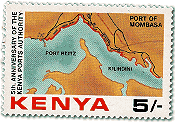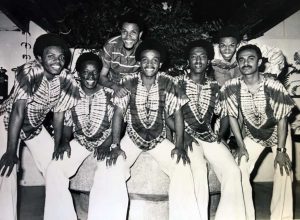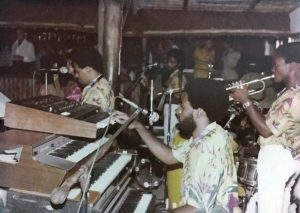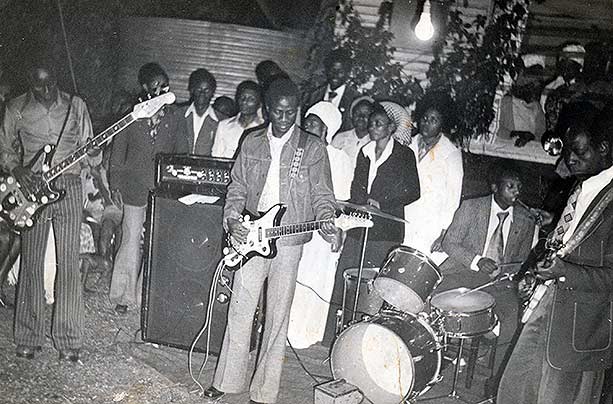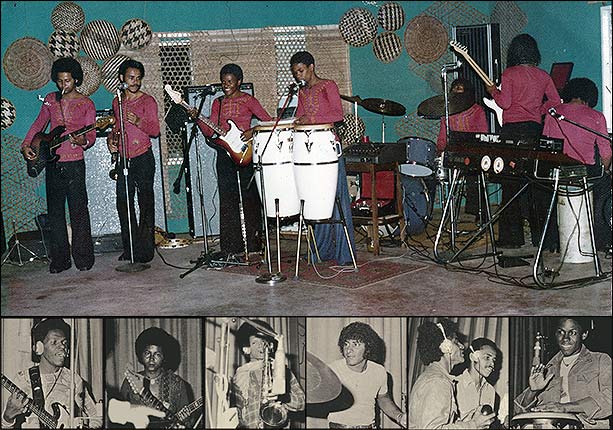![]()
![]() When thinking of urban coastal Kenyan musicians whose careers run decades deep, taarab performers may be the first who come to mind. Indeed, taarab taps into a poetic tradition that goes back centuries and it may be the longest surviving thread in popular music across the Swahili coast. Sadly, in recent years the thriving scenes of Mombasa and other coastal towns have become increasingly quiet, for a number of reasons including economic decline, the ageing of the live musicians who came up in the 1960s and ‘70s, Congolese and later Nigerian music becoming popular, and the recent clampdown on terrorism which adversely affected public life in Mombasa.
When thinking of urban coastal Kenyan musicians whose careers run decades deep, taarab performers may be the first who come to mind. Indeed, taarab taps into a poetic tradition that goes back centuries and it may be the longest surviving thread in popular music across the Swahili coast. Sadly, in recent years the thriving scenes of Mombasa and other coastal towns have become increasingly quiet, for a number of reasons including economic decline, the ageing of the live musicians who came up in the 1960s and ‘70s, Congolese and later Nigerian music becoming popular, and the recent clampdown on terrorism which adversely affected public life in Mombasa.
There’s another Kenyan coastal sound, one that came up in the seventies and survived it all, a genre that even enjoyed commercial success abroad but has often remained ignored and despised by western critics. Afro7 previously released an EP re-introducing one of the finest examples of this school: Them Mushrooms, a band that played its part in the introduction of coastal dances like cha-cha to the masses; then the second volume of Kenya Special included Hinde, a song from the mid-eighties by African Vibration which even made Kikuyu people in Nairobi speak a bit of the coastal Giriama language at the time, as it became an anthem of sorts. Taarab music has been the essential wedding music of the Swahili coast, but these new bands made their living recording for the club and radio, and performing in hotels. Even though the different currents in Mombasa taarab all borrowed from a multitude of local and foreign genres, Them Mushrooms, Safari Sound Band and the likes created a type of pop music with a modern sound led by keyboards and drum machines that was soon embraced by the eclectic Kenyan audience and foreign visitors alike.
![]() One of the most prolific bands in this field has been Mombasa Roots. They recently hit their 40th anniversary, not a small feat in the Kenyan musical landscape that is full of pitfalls. When they started out in 1977, the group was made up of the brothers Ebrahim, Suleiman and Ethiopian drummer Tamrat Kebede, among others; another Juma brother, the late Ahmed Juma, joined the next year as he left the Mombasa Vikings. In 1979 the band, trying their best to come up with their own compositions, recorded their first single in their residence at Muthaiga (Nairobi) with the assistance of Nabil Sansool, the Syrian born producer who, later on, would assist in elevating the production values of Kenyan coastal music. On What Is It That You Want / My Everything, which was released on the Mombasa Roots imprint, the band was still carving out their own niche, and it wasn’t a big hit. Unlike other bands, they invested in their own instruments and the equipment from the start, which helped them finetune the sound that propelled them to fame by the mid-eighties.
One of the most prolific bands in this field has been Mombasa Roots. They recently hit their 40th anniversary, not a small feat in the Kenyan musical landscape that is full of pitfalls. When they started out in 1977, the group was made up of the brothers Ebrahim, Suleiman and Ethiopian drummer Tamrat Kebede, among others; another Juma brother, the late Ahmed Juma, joined the next year as he left the Mombasa Vikings. In 1979 the band, trying their best to come up with their own compositions, recorded their first single in their residence at Muthaiga (Nairobi) with the assistance of Nabil Sansool, the Syrian born producer who, later on, would assist in elevating the production values of Kenyan coastal music. On What Is It That You Want / My Everything, which was released on the Mombasa Roots imprint, the band was still carving out their own niche, and it wasn’t a big hit. Unlike other bands, they invested in their own instruments and the equipment from the start, which helped them finetune the sound that propelled them to fame by the mid-eighties.
![]() It was a string of singles, released in 1984 and 1985, and ultimately compiled on their first lp ‘MSA-Mombasa’ (1987), that landed the work of Mombasa Roots in discos, bars and jukeboxs in the remotest corners of the country. ‘Disco cha-ka-cha’ was a sensation when it came out, a bold attempt at reinterpreting a semi-traditional female wedding dance for the clubs, but it worked well. Up to that point, the most common way for urban Kenyans and foreign visitors to hear traditional Kenyan music had been through performances during ceremonies or aimed at tourists. Their version of ’Kata’, a sparse and hypnotic rhythm with the right touch of keyboard, is still well remembered after three decades. The chakacha dance songs helped them gain popularity among the taarab audience, but It was their version of ‘Kasha langu’, a Swahili evergreen first recorded in the 1950’s, that got them a lot of new fans; it’s still a part of Mombasa Roots’ live set today.
It was a string of singles, released in 1984 and 1985, and ultimately compiled on their first lp ‘MSA-Mombasa’ (1987), that landed the work of Mombasa Roots in discos, bars and jukeboxs in the remotest corners of the country. ‘Disco cha-ka-cha’ was a sensation when it came out, a bold attempt at reinterpreting a semi-traditional female wedding dance for the clubs, but it worked well. Up to that point, the most common way for urban Kenyans and foreign visitors to hear traditional Kenyan music had been through performances during ceremonies or aimed at tourists. Their version of ’Kata’, a sparse and hypnotic rhythm with the right touch of keyboard, is still well remembered after three decades. The chakacha dance songs helped them gain popularity among the taarab audience, but It was their version of ‘Kasha langu’, a Swahili evergreen first recorded in the 1950’s, that got them a lot of new fans; it’s still a part of Mombasa Roots’ live set today.
![]() From its inception, Mombasa Roots played the live circuit on the coast and upcountry in clubs aiming at local audiences and foreign tourists, too. In the years to come they accepted gigs abroad, which led them to places like Germany, Dubai and Ethiopia, where they have been regular guests for the past twenty years. And despite most of the founding members leaving the group (Tamrat and Emile since passed away), Mombasa Roots is still going strong today. The band performs in different venues seven days a week with a diverse line-up of young musicians led by veteran Ebrahim Juma, playing own compositions and covers. The latest Afro7 release is a tribute to these pioneers of Kenyan pop music. The EP combines the first Mombasa Roots Band single from 1979 with three of their biggest hits from the mid-eighties: the melancholic ‘Kasha Langu’, the poppy disco of ‘Karibishe’ and the chakacha trance groove of ‘Mezea tu (Lele mama)’.
From its inception, Mombasa Roots played the live circuit on the coast and upcountry in clubs aiming at local audiences and foreign tourists, too. In the years to come they accepted gigs abroad, which led them to places like Germany, Dubai and Ethiopia, where they have been regular guests for the past twenty years. And despite most of the founding members leaving the group (Tamrat and Emile since passed away), Mombasa Roots is still going strong today. The band performs in different venues seven days a week with a diverse line-up of young musicians led by veteran Ebrahim Juma, playing own compositions and covers. The latest Afro7 release is a tribute to these pioneers of Kenyan pop music. The EP combines the first Mombasa Roots Band single from 1979 with three of their biggest hits from the mid-eighties: the melancholic ‘Kasha Langu’, the poppy disco of ‘Karibishe’ and the chakacha trance groove of ‘Mezea tu (Lele mama)’.
Head over to our shop to secure your copy, in shops on the 13th of April, but we’ll start shipping out preorders as fast as we have them.
 ‘See Lamu, see Paradise’ describes the archipelago of Indian Ocean Islands off Kenya’s northern shores. Each Island has its share of Arabian Nights’ history, often only preserved in song and folk-tale, and this collection contains recordings of music which has all but disappeared into the mist of Time. Under the palm trees beside the white sand beaches, on sea-going dhows and in time of traditional celebrations, singers and instrumentalist give you songs of long ago with authenticity and lilting loveliness. A1) Song Of The Coconut Climers: ‘Life is a gift from God’, is the message from this gay melody. A2) Flute Among The Sand Dunes: On the eve of a celebration, soft music of the flute floats hauntingly in the Lamu air. A3) Lamu Love Song: A poem of dreams – treasure and a wedding bed made of Ivory tusks, sung here in a narrow backstreet by Hadija Hamisi. A4) The Siwa Horns Of Lamu: As sailing dhows return from their long sea-journeys, captains order the traditional Siwa horns to be Blown. A5) Ocean Song: In a beautiful melody, accompanied on the bow-harp Uta, Athman bin Khamis tells the love of the sea. B1) Uta Dance: The abundance of the coconut crop brings this happy celebration from the pickers, with their UTA bow-harp. B2) Zumari Music: A wedding celebration by the high-pitch traditional wind instrument of the islands. B3) Love Poem of Mwana Kupona: Lessons of the happy life and successful marriage. B4) Matondoni Celebration: The women of this little village gather, with drums and horns, to dance the age-old Vugo. B5) Coconut Climbers Dance: Warm nights are gladdened by the enchanting music of this dance by the coconut gatherers.
‘See Lamu, see Paradise’ describes the archipelago of Indian Ocean Islands off Kenya’s northern shores. Each Island has its share of Arabian Nights’ history, often only preserved in song and folk-tale, and this collection contains recordings of music which has all but disappeared into the mist of Time. Under the palm trees beside the white sand beaches, on sea-going dhows and in time of traditional celebrations, singers and instrumentalist give you songs of long ago with authenticity and lilting loveliness. A1) Song Of The Coconut Climers: ‘Life is a gift from God’, is the message from this gay melody. A2) Flute Among The Sand Dunes: On the eve of a celebration, soft music of the flute floats hauntingly in the Lamu air. A3) Lamu Love Song: A poem of dreams – treasure and a wedding bed made of Ivory tusks, sung here in a narrow backstreet by Hadija Hamisi. A4) The Siwa Horns Of Lamu: As sailing dhows return from their long sea-journeys, captains order the traditional Siwa horns to be Blown. A5) Ocean Song: In a beautiful melody, accompanied on the bow-harp Uta, Athman bin Khamis tells the love of the sea. B1) Uta Dance: The abundance of the coconut crop brings this happy celebration from the pickers, with their UTA bow-harp. B2) Zumari Music: A wedding celebration by the high-pitch traditional wind instrument of the islands. B3) Love Poem of Mwana Kupona: Lessons of the happy life and successful marriage. B4) Matondoni Celebration: The women of this little village gather, with drums and horns, to dance the age-old Vugo. B5) Coconut Climbers Dance: Warm nights are gladdened by the enchanting music of this dance by the coconut gatherers.









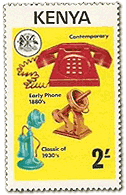 Love songs, irrespective of lyrical inspiration or language used – are endearing and captivating. They always have a way that connects to audiences with consummate ease. The song Amalia is no exception, despite its seemingly economical use of verses, astutely weaved around four simple lines that ooze with passion. Undeniably, the song-writer must have been deeply smitten and enamored by his feelings for Amalia. She is lyrically described as being “..ua langu la maisha ya dunia…” [the flower in his life on earth]. His heart yearns intensely for her charm, and love to shine through the darkness of a lifetime without her presence. The song’s laid-back and mellow refrain did likely serenade countless couples on the dance-floor, drawing lovebirds closer in tight embrace, each enveloped in the idyllic moment. Witty words like bolero [means slow-tempo] engraved on the 45rpm sleeve, were used to categorize specific tracks. Anyone with a keen ear for good music is bound to appreciate song’s adeptly structured guitar-work and rhythmic interplay, crafted during what was a possibly riveting recording session. On the flip side, Lakusema Mimi Sina – loosely translates in English as having nothing to say, steps up the tempo a notch higher but lyrics maintain the quest-for-love theme. Notably, either track bears less or minimal foreign influences – a tactful departure from the commonplace feature for most bands of the era. There is hardly any pronounced James Brown overtones on the trend-setting
Love songs, irrespective of lyrical inspiration or language used – are endearing and captivating. They always have a way that connects to audiences with consummate ease. The song Amalia is no exception, despite its seemingly economical use of verses, astutely weaved around four simple lines that ooze with passion. Undeniably, the song-writer must have been deeply smitten and enamored by his feelings for Amalia. She is lyrically described as being “..ua langu la maisha ya dunia…” [the flower in his life on earth]. His heart yearns intensely for her charm, and love to shine through the darkness of a lifetime without her presence. The song’s laid-back and mellow refrain did likely serenade countless couples on the dance-floor, drawing lovebirds closer in tight embrace, each enveloped in the idyllic moment. Witty words like bolero [means slow-tempo] engraved on the 45rpm sleeve, were used to categorize specific tracks. Anyone with a keen ear for good music is bound to appreciate song’s adeptly structured guitar-work and rhythmic interplay, crafted during what was a possibly riveting recording session. On the flip side, Lakusema Mimi Sina – loosely translates in English as having nothing to say, steps up the tempo a notch higher but lyrics maintain the quest-for-love theme. Notably, either track bears less or minimal foreign influences – a tactful departure from the commonplace feature for most bands of the era. There is hardly any pronounced James Brown overtones on the trend-setting 

 Awengele was a self-styled ‘boy band’ comprising four members, all of Luhya origin (West Kenya). Barely out of school, they were all pursuing careers – as an engineer, civil servant, a cartoonist and marketeer – and played music in their free time, doing regular shows at schools and public events, but never on the club circuit. Inspired by the afro-rock of Osibisa as well as Santana and the Motown hits of the mid-seventies, their style was defined by the musical instruments at their disposal: guitar, bass and a drum kit. Through their manager Joe Kuria they got to record a single for the Akili label, adding an organ to the mix. Kenyan 45s typically mentioned the style of the song on the label, and their self-titled debut listed both ‘rock’ and ‘Maasai’. The latter referred to the vocal style used on the chorus, which was obviously inspired by Maasai chants, and to the song’s lyrics which were in Luhya with a few words of Maasai thrown in; the flipside was in English. Kenya in the 1970s counted a handful of other bands playing rock (never as many as Zambia or Nigeria though). These included Black Savage and Jimmy Mawi, who was an inspiration to the group as they often played together. However, Awengele’s fusion of soul, funk and psych-rock was one of a kind. This and many more great tracks from Kenyas musical golden era 1970s & ’80s are out now on Soundway’s Kenya Special:Volume II, get your copy from the
Awengele was a self-styled ‘boy band’ comprising four members, all of Luhya origin (West Kenya). Barely out of school, they were all pursuing careers – as an engineer, civil servant, a cartoonist and marketeer – and played music in their free time, doing regular shows at schools and public events, but never on the club circuit. Inspired by the afro-rock of Osibisa as well as Santana and the Motown hits of the mid-seventies, their style was defined by the musical instruments at their disposal: guitar, bass and a drum kit. Through their manager Joe Kuria they got to record a single for the Akili label, adding an organ to the mix. Kenyan 45s typically mentioned the style of the song on the label, and their self-titled debut listed both ‘rock’ and ‘Maasai’. The latter referred to the vocal style used on the chorus, which was obviously inspired by Maasai chants, and to the song’s lyrics which were in Luhya with a few words of Maasai thrown in; the flipside was in English. Kenya in the 1970s counted a handful of other bands playing rock (never as many as Zambia or Nigeria though). These included Black Savage and Jimmy Mawi, who was an inspiration to the group as they often played together. However, Awengele’s fusion of soul, funk and psych-rock was one of a kind. This and many more great tracks from Kenyas musical golden era 1970s & ’80s are out now on Soundway’s Kenya Special:Volume II, get your copy from the 
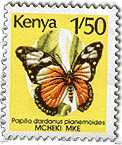


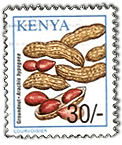 Happy summer! We are have been working hard to update the site to be more mobile friendly and will keep adding more vintage stock throughout the year! Keep coming back in!
Happy summer! We are have been working hard to update the site to be more mobile friendly and will keep adding more vintage stock throughout the year! Keep coming back in!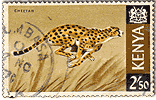 This song rekindles memories of the fiery wave of the black consciousness movement that swept across the African diaspora from 1960s through to the ’80s. The Rift Valley Brothers band’s lyrics are seemingly a clarion call imploring local Kenyans to come to terms with their rich African roots and home-grown heroes. These were likely inspired and penned in praise of Kenya’s liberation struggle and key Mau Mau frontline freedom fighters. Several unsung and long forgotten ‘bush’ generals are saluted for their sweat, gallantry and bloodshed. But the underlying message is undeniably emphatic on the pressing need (especially for the younger generation) to embrace selfconsciousness and pride in their African heritage.
This song rekindles memories of the fiery wave of the black consciousness movement that swept across the African diaspora from 1960s through to the ’80s. The Rift Valley Brothers band’s lyrics are seemingly a clarion call imploring local Kenyans to come to terms with their rich African roots and home-grown heroes. These were likely inspired and penned in praise of Kenya’s liberation struggle and key Mau Mau frontline freedom fighters. Several unsung and long forgotten ‘bush’ generals are saluted for their sweat, gallantry and bloodshed. But the underlying message is undeniably emphatic on the pressing need (especially for the younger generation) to embrace selfconsciousness and pride in their African heritage. 


